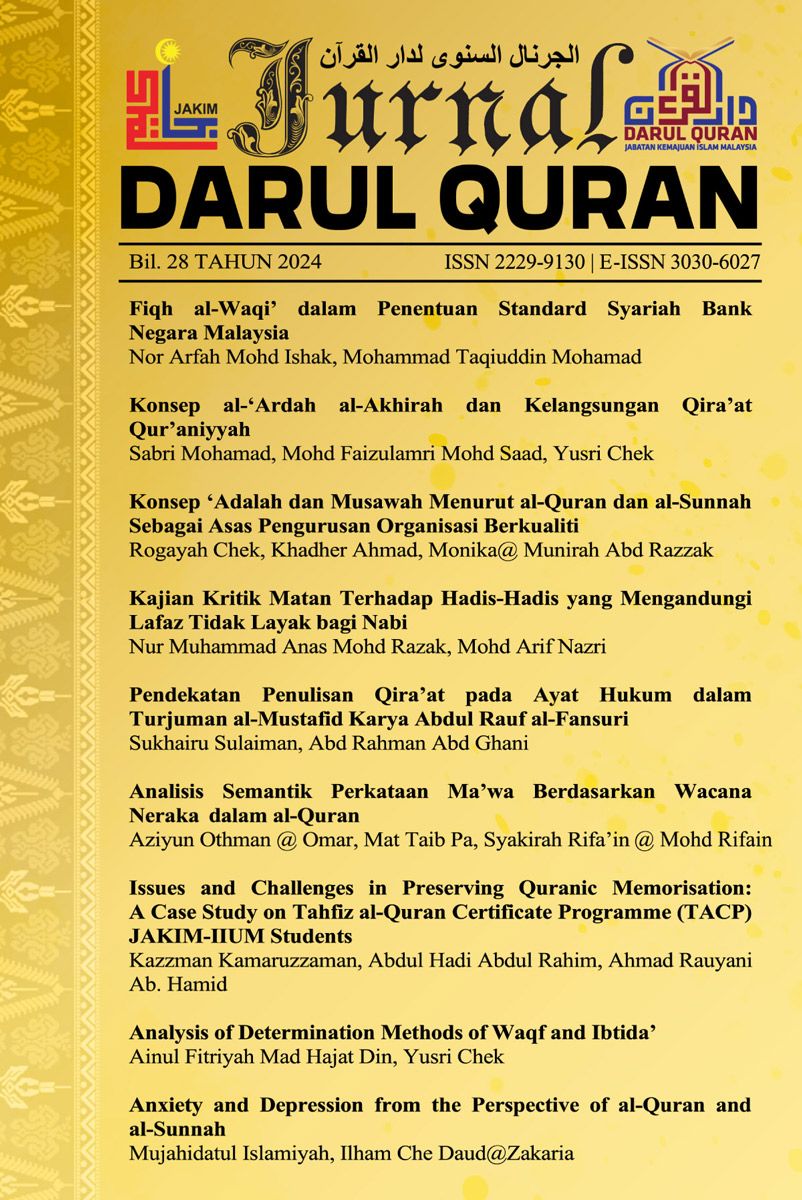Issues and Challenges in Preserving Quranic Memorisation: A Case Study on Tahfiz al-Quran Certificate Programme (TACP) JAKIM-IIUM Students

Penulis
Abdul Hadi Abdul Rahim
Ahmad Rauyani Ab. Hamid
International Islamic University Malaysia, Gambang, Pahang
Abstrak
Rujukan
Abd Hamid, M. H., Isa, A. A. M., & Ishak, H. (2021). Faktor pembelajaran tahfiz program huffaz profesional di Universiti Tenaga Nasional (UNITEN): Implementation of learning tahfiz program of professional huffaz at Universiti Tenaga Nasional (UNITEN). *al-Irsyad: Journal of Islamic and Contemporary Issues, 6*(1), 596-605.
Abdul Rahim, M. M., Yussuf, A., Borham, A. H., & Kamarul Zaman, M.A. (2016). Amalan pengajaran pensyarah tahfiz al-Quran di Malaysia: Teaching practice among tahfiz al-Quran lecturer in Malaysia. *Journal of Islamic Educational Research, 1*(1), 11-20. Retrieved from https://ejournal.um.edu.my/index.php/JIER/article/view/2158
Abdullah, M., Abdullah, A. H., Rosman, A. S., & Ilias, M. F. (2016). Tanggungjawab Hufaz Menurut Al-Nawawi Dalam Fi Adabil Hamlatil Quran. *International Journal of Humanities Technology and Civilization (IJHTC,1*(2), 42-49.Abū Dāwūd, S. bin al-A. al-S. (1984). *Sunan Abū Dāwūd* (Vol. 2, A.Hasan, Trans.). SH. Muhammad Ashraf.
Al Hafiz, M. M., Yusof, M. F., Ghazali, M. A. I., & Sawari, S. S. M. (2016). Historiography of Quranicmemorization from the early years of Islam until today. *Mediterranean Journal of Social Sciences, 7*(1 S1), 279.
Al-ʿAsqalānī, A. al-F. A. bin ʿA. bin Ḥ. (2001). *Fatḥ al-Bārī bi Sharḥ Ṣaḥīḥ al-Bukhārī* (Vol. 8). Dār Miṣr.
Al-Bakri, Z. M. (2018). Al-Kafi li Al-Fatawi: #938 The ruling of forgetting one’s memorization the Quran. Retrieved from https://muftiwp.gov.my/en/artikel/al-kafi
Al-Bukhārī, M. ibn I. (1984). *The Translation of the Meaning of Ṣaḥīḥ
al-Bukhārī* (Vol. 6, M. M. Khan, Trans.). Kitab Bhavan.
Ali, A. Y. (1996). *The Holy Quran: Text and Translation*. Islamic Book Trust.
Al-Nawāwī, M. al-D. A. Z. Y. bin S. (2004). *Ṣaḥiḥ Muslim bi Sharḥ al-Nawāwī* (2nd ed., Vol. 5). Dār al-Fajr li al-Turāth.
Al-Nawawi. (2017). *Al-Tibyān fī Ādāb Ḥamalat al-Qur’ān: Adab Pembaca Al-Qur’an*. Telaga Biru Sdn. Bhd.
Alsubaie, M. M., Stain, H. J., Webster, L. A. D., & Wadman, R. (2019). The role of sources of social support ondepression and quality of life for university students. *International Journal of Adolescence and Youth, 24*(4), 484-496. https://doi.org/10.1080/02673843.2019.1568887
Al-Tarmidhī, A. ʿI. M. bin ʿI. (2006). *Sunan al-Tarmidhī* (2nd ed., K. ʿAbd al-Ghānī Maḥfūẓ, Trans.). Dār al-Kutubal-ʿIlmiyyah.
Altine, Z. (2019). Methods and importance of Qur’anic Hifdh (Memorisation): An Islamic perspective. *EAS Journal of Humanities and Cultural Studies, 1*(5), 288-296.
Chiu, T. K. F. (2022). Applying the self-determination theory (SDT) to explain student engagement in online learning during the COVID-19 pandemic. *Journal of Research on Technology in Education, 54*(sup1), S14-S30. https://doi.org/10.1080/15391523.2021.189199
Darul Quran. (2015). Maklumat Korporat: Objektif, Visi, Misi, Falsafah. Retrieved Feb 12, 2015, from http://www.darulquran.gov.my/
Darul Quran. (2022). Pensijilan tahfiz al-Quran JAKIM-IIUM. Retrieved fromhttps://www.darulquran.gov.my/xs/page.php?id=14
Deci, E. L., & Ryan, R. M. (1985). *Intrinsic motivation and self- determination in human behavior*. Plenum Press.
Dzulkifli, M. A., & Solihu, A. K. H. (2018). Methods of Qurʾānic memorisation (Ḥifẓ): Implications for learning performance.
*Intellectual Discourse, 26*(2), 931-947.
Hashim, A. (2010). Penilaian pelaksanaan kurikulum tahfiz al-quran di Darul Quran JAKIM dan Maahad Tahfiz Al-Quran Negeri. [Unpublished doctoral dissertation]. Universiti Kebangsaan Malaysia.
IIUM. (2021). Program Persijilan Tahfiz Al-Quran JAKIM - IIUM [PowerPoint Slides]. Retrieved from https://www.iium.edu.my/media/69722/Tahfiz%20JAKIM%20-%20IIUM%202021%20Slide%20Promo%205%20mei%202021.pdf
Mohamad, K. A. (2016). *Sistem Kawalan Kualiti Huffaz: Memperkasa Generasi Penghafaz al-Quran*. Darul QuranJAKIM & Centre of Quranic Research (CQR).
Morgan, D. L., Krueger, R. A., & King, J. A. (1998). *The focus group kit* (Vols. 1–6). Sage Publications Inc.
Muslim, ibn al-Ḥajjāj, A. al-Ḥ. (1999). *Ṣaḥiḥ Muslim* (Vol. 6, ʿA. Ṣiddīqī, Trans.). Adam Publishers & Distributors.
Nawi, M. Z. M., Omar, M. R., & Nor, M. A. M. (2021). Sistem Pendidikan Tahfiz di Malaysia, Pilihan Ibu Bapa Dan Warisan Pendidikan Islam Andalus: Satu Sorotan. *Asian People Journal (APJ, 4*(1), 132-147. Nyumba, T. O., Wilson, K., Derrick, C. J., & Mukherjee, N. (2018). The use of focus group discussion methodology: Insights from two decades of application in conservation. *Methods in Ecology and Evolution, 9*(1), 20-32. https://doi.org/10.1111/2041- 210x.12860
Shahrulkarnain, M. N. (2013). Program sijil tahfiz al-Qur’an Darul Quran Jakim Universiti Islam AntarabangsaMalaysia: Analisis terhadap pencapaian hafazan dan permasalahannya. [Master’s Thesis, Universiti Malaya]. Retrieved from http://studentsrepo.um.edu.my/5321/1/AWALAN.pdf
Vallacher, R. R., & Wegner, D. M. (1987). What do people think they're doing? Action identification and humanbehavior. *Psychological Review, 94*(1), 3-15. https://doi.org/10.1037/0033-295X.94.1.3
